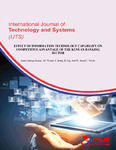| dc.contributor.author | Kamau, James Gathogo | |
| dc.contributor.author | Senaji, Thomas A. | |
| dc.contributor.author | Nzioki, Susan | |
| dc.date.accessioned | 2019-07-23T08:18:50Z | |
| dc.date.available | 2019-07-23T08:18:50Z | |
| dc.date.issued | 2019 | |
| dc.identifier.issn | 2518-881X | |
| dc.identifier.uri | http://ir.mksu.ac.ke/handle/123456780/4636 | |
| dc.description.abstract | Purpose: The study sought to establish the effect of Information Technology Capability on competitive advantage of the banking sector in Kenya. Methodology: The study is anchored on the McKinsey 7S Framework Model and the dynamic capability Theory. A positivist research philosophy was adopted for the study. Focusing on 39 operational commercial banks in Kenya, a descriptive survey design was adopted. Primary data was collected and applied in the study. Findings: The relationship between the variables was tested using ordinary east square regression model. The study findings revealed that strategic capabilities, that is information technology capability have a positive and significant effect on competitive advantage of commercial banks in Kenya. Unique contribution to theory, practice and policy: The study findings led to the recommendation that the commercial banks should enhance the practices that improves their strategic capabilities | en_US |
| dc.language.iso | en_US | en_US |
| dc.publisher | IPRJB | en_US |
| dc.subject | Information Technology Capability | en_US |
| dc.subject | Commercial Bank and Competitive Advantage | en_US |
| dc.title | Effect of Information Technology Capability On Competitive Advantage of the Kenyan Banking Sector | en_US |
| dc.type | Article | en_US |

